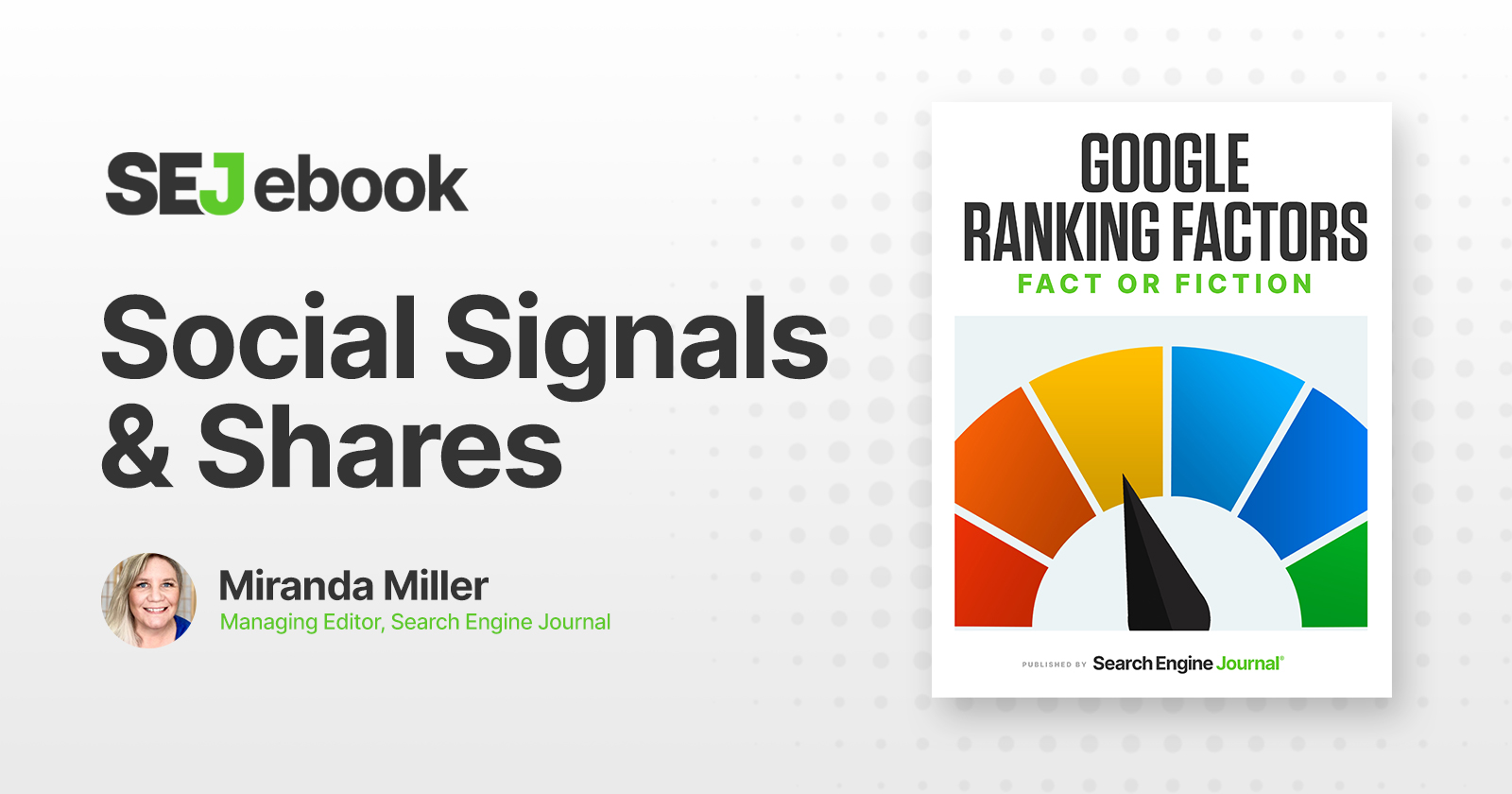
Do social signals affect organic search rankings?
Google says no.
Some correlation studies claim to show otherwise.
Let’s clear up the confusion.
The Claim: Social Signals Are A Ranking Factor
First, let’s determine what we’re talking about here.
Social signals, for the purposes of this discussion, generally refer to things like:
- Facebook engagements (likes, comments, shares).
- Twitter engagements (tweets, retweets, likes).
In the past, social signals also referred to activity like Google +1 (back when Google Plus was kind of / sort of relevant, circa 2012-2013).
Raw follower counts have also been mentioned as part of the “social signals” discussion.
Now, as for the idea that social signals are a ranking factor, it basically comes to this:
Content ranks well and gets lots of traffic.
Content has lots of social media shares.
Share count must have helped it rank well.
The Evidence For Social Signals As A Ranking Factor
Where did the whole idea of social signals originate? To find out, let’s go back to 2010, when Danny Sullivan wrote What Social Signals Do Google & Bing Really Count?
“…who you are as a person on Twitter can impact how well a page does in regular web search. Authoritative people on Twitter lend their authority to pages they tweet. When it comes to Facebook, Google says it does [try to calculate someone’s authority], in some limited cases.”
That was followed a few days later by a video from Google’s Matt Cutts, in which he confirmed they use Facebook and Twitter links in ranking (“as we always have”).
Cutts also stated that Google was looking into using the reputation of authors or creators as a ranking signal.
Many ranking correlation studies over the years have noted a strong relationship between social signals and organic search ranking.
For example, Moz released its final ranking factor correlation study (and survey) in 2015. It found that the number of social shares a page accumulated had a positive correlation with rankings.
In the survey, Moz asked 150 marketing professionals whether the number of social media shares a page was influential on organic ranking, specifically:
“Quantity/quality of tweeted links, Facebook shares, Google +1s, etc. to the page.”
Of all the ranking factors, page-level social metrics were rated as having the lowest impact.
Two important notes here:
- A survey is not a fact.
- Correlation is not causation.
In 2016, CognitiveSEO did a study on whether social signals influence SEO.
Their findings were that a strong social media presence and shares from Facebook, Google Plus, LinkedIn, and Pinterest correlated with higher rankings.
In 2018, HootSuite did a study to determine whether social media impacts SEO.
They found a strong correlation between social activity on Twitter and rankings.
The Evidence Against Social Signals As A Ranking Factor
In 2011, Sullivan asked Cutts about a correlation Moz found between Facebook shares and Google rankings. Cutts said,
“Google doesn’t get Facebook shares. We’re blocked by that data. We can see fan pages, but we can’t see Facebook shares.”
In 2014, Cutts was asked the following question: “Are Facebook and Twitter signals part of the ranking algorithm? How much do they matter?”
His answer:
“Facebook and Twitter pages are treated like any other pages in our web index so if something occurs on Twitter or occurs on Facebook and we’re able to crawl it, then we can return that in our search results. But as far as doing special specific work to sort of say ‘you have this many followers on Twitter or this many likes on Facebook’, to the best of my knowledge we don’t currently have any signals like that in our web search ranking algorithms.”
Also:
“We have to crawl the web in order to find pages on those two web properties and we’ve had at least one experience where we were blocked from crawling for about a month and a half. And so the idea of doing a lot of special engineering work to try to extract some data from webpages when we might get blocked from being able to crawl those web pages in the future, is something where the engineers would to be a little bit leery about doing that.”
In 2015, Google’s John Mueller was asked: “Do social signals have an impact on organic rankings in Google?”
His response: “Not directly, no.”
What does that mean?
He went on to elaborate that social posts show up in the search results (e.g., Twitter content) and can rank for certain keywords (your product name, brand, etc.).
Here’s his full answer, with the full context:
In 2016, Google’s Gary Illyes responded to a tweet about whether Google takes social into account for SEO.
His response: “No, we don’t.”
take a look at this video. https://t.co/zPKuZRNaoy
The short version is, no, we don’t@louisgray @PRNews @JohnMu— Gary “鯨理/경리” Illyes (@methode) June 7, 2016
Illyes even shared a link to the Cutts video from 2014.
A few other things to consider:
- Most social networks nofollow links. Thus, any links to a webpage wouldn’t pass any authority.
- Facebook can’t crawl all of Facebook, for example. So how would they calculate influence on that social network? And even if they could, that’s a heck of a lot of data to crawl, index, and make sense of.
- Also, social signals are fairly easy to manipulate. You can buy followers and likes and pretty much anything you want. But it’s more likely a bot than a human. Will buying your “social signals” result in any actual engagement? Not likely – especially considering that a 2016 study found that 59% of URLs shared on Twitter never get clicked.
Social Signals As A Ranking Factor: Our Verdict
Social signals simply won’t help your content rank any better.
Great content tends to rise to the top (granted, not always).
It’s more likely that the correlation you’re seeing between social signals and SEO is actually just people sharing great content – because it’s great.
People tend to not share terrible content because it’s terrible (and it doesn’t rank in organic search or drive much/any traffic).
Social media content absolutely can help your brand/company/product/whatever appear in organic results.
And social media has plenty of indirect benefits (e.g., engagement, traffic, brand awareness, personal branding).
All of these can help your SEO efforts, but indirectly.
Bottom line: It’s unlikely that if you get X number of likes, shares, or followers, or whatever vanity metric, that Google uses social signals as a ranking factor.
Featured Image: Robin Biong/Search Engine Journal







